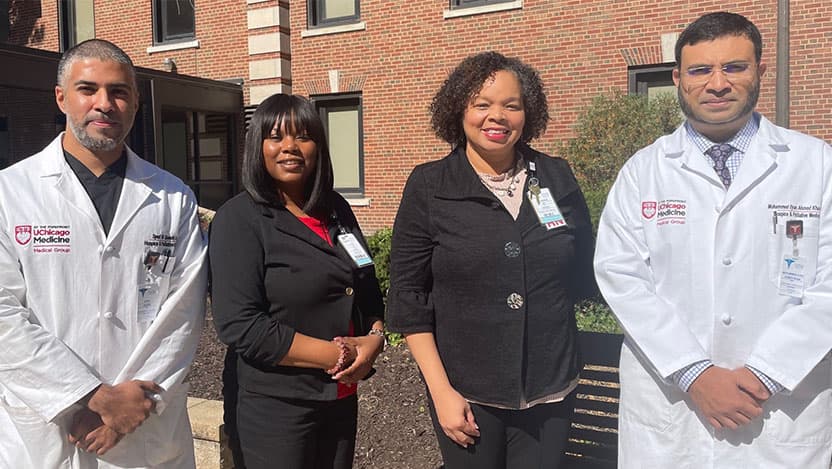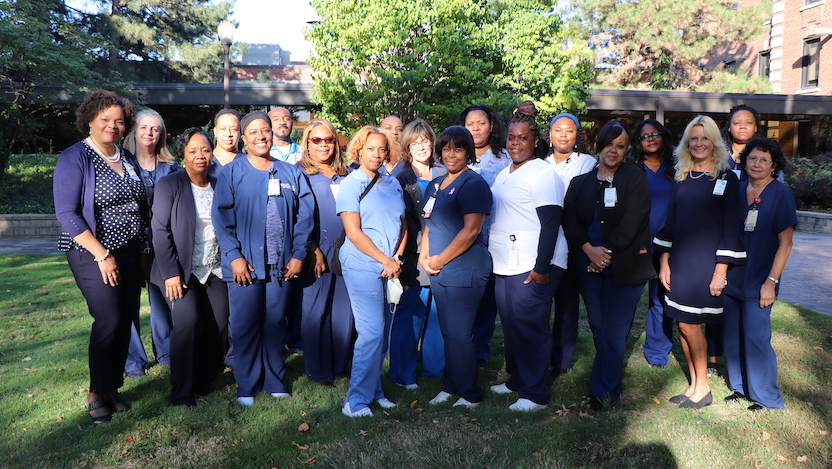For the terminally ill, UChicago Medicine Ingalls Hospice offers comfort, compassion and support for families

After learning one of their hospice patients would be living alone in a nursing home without family support, the staff at UChicago Medicine Ingalls Hospice devised a plan.
To create a sense of home and family, they all collaborated to get their patient a TV, clothes and holiday decorations. Upon seeing everything the staff did, the patient cried.
“It was unexpected, and the patient felt so grateful, loved and cared for,” said hospice program director Eleanor Williams, RN.
It’s just one example of the special, compassionate care the staff at UChicago Medicine Ingalls Hospice has provided to terminally ill patients and their families for more than 30 years.
Ingalls' hospice program is licensed, accredited and provides patients with a personal care team who can make them comfortable in the final months or weeks of their lives.
Board certified and specially trained physicians, registered nurses and certified nurses’ aides tend to the patient's pain and other physical needs. Social workers and clergy help with the social, emotional and spiritual needs of the patient and their family members.
There's a lot of apprehension and anxiety associated with the word hospice, but we're there to support them at this difficult phase in their life.
Medicare, Medicaid, most HMOs and private insurance usually cover all hospice expenses. No patient will ever be denied hospice care because of an inability to pay. Patients and their families always have the option to cancel hospice care at any time if other choices are desired.
"At Ingalls' hospice program, the team looks after each patient as if they're their own family member," said UChicago Medicine Medical Group hospice and palliative physician Syed Quadri, MD,* Clinical Associate of Medicine.
"It's that personal connection we have with these patients and their families that makes the difference," he said. "We also provide patients with the best symptom management we have."
Whether the patient has cancer-related pain, chronic obstructive pulmonary disease (COPD), Alzheimer's, heart failure or any other issue, the hospice physicians can prescribe anything from anti-nausea medication to strong opioid medications to keep the person comfortable, Quadri said.
Ingalls' steadily growing hospice program treats about 50 people at any given time, either in the patient’s home, their nursing home, or in the inpatient hospice program.
Plans are now in the works to expand the program, said UChicago Medical Group physician Mohammed Ilyas Ahmed Khan, MD,* Hospice and Palliative Care Medical Director.

The hospital’s hospice space, located down the hall from the intensive care unit, was recently remodeled with new furniture, lighting, flooring and paint, courtesy of the Ingalls Development Foundation.
UChicago Medicine Ingalls Hospice encourages family and friends to visit patients so everyone can talk, tell stories, laugh, pray, sing, eat their favorite foods, listen to music or even watch a ballgame on TV.
“Those final moments can be beautiful when the family is all around,” Williams said. “Sometimes, it’s so difficult for families to accept that their loved ones need hospice, but then they realize that we can make them comfortable. It helps everyone.”
Many people wish to spend their final days at home. If there is someone living in the house who can assist, the hospice program can provide a hospital bed, shower equipment and oxygen tanks. Nurses visit regularly (and are available by phone 24/7) to make sure the patient is cared for and not in pain. Nurses assistants make sure the patient stays clean and comfortable.
“Comfort care is just as important as critical care,” Williams said. “It doesn’t completely remove the burden of care for the family, but it makes it a little lighter because they have all these services.”
Williams decided to become a critical care and home health care nurse after caring for her mother, who had vascular dementia. She knows firsthand the importance of comfort care and the stress caregiving can put on the family. She now leads UChicago Medicine Ingalls Hospice along with Executive Director Joseph Larkin, BSN, RN.
“You definitely have to have a heart for people to do this job. Not just for the patients, but for their families,” Williams said. “They need hospice as much as the patient does.”
Mary Ann Carnes, RN, a nurse for 35 years and an Ingalls hospice nurse since 2015, said she enjoys getting to know the patients and their families.
She’s provided end-of-life care to everyone from a 23-year-old college student to an elderly cancer patient who was in hospice for three years. She knows the pain families and friends experience and can explain to them what is happening to their loved ones physically, while offering comforting words. Many families call her to thank her after their loved ones pass or send her thoughtful notes.
“I just tell them, I’m here to support you,” she said. “I had one patient whose family always got together to talk about his life, laugh about the things he did, and then they’d do a toast to him. I thought, that’s the way to do it. To celebrate their life.”
Ahmed Khan said people often don't like to ask for help when a loved one is dying, but they need to know that help is available.
"There's a lot of apprehension and anxiety associated with the word hospice, but we're there to support them at this difficult phase in their life. These patients need additional support and we have professionals and physicians who will provide them with excellent care."
UChicago Medicine Ingalls Hospice welcomes volunteers to provide companionship for patients and assist with administrative tasks. For information, call 708-331-1360.
* Mohammed Ilyas Ahmed Khan, MD and Syed Quadri, MD, are UChicago Medicine Medical Group providers. UChicago Medicine Medical Group comprises UCM Care Network Medical Group, Inc. and Primary Healthcare Associates, S.C. UChicago Medicine Medical Group providers are not employees or agents of the University of Chicago Medical Center, the University of Chicago, UChicago Medicine Ingalls Hospice or UChicago Medicine Ingalls Memorial.
